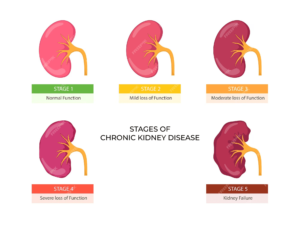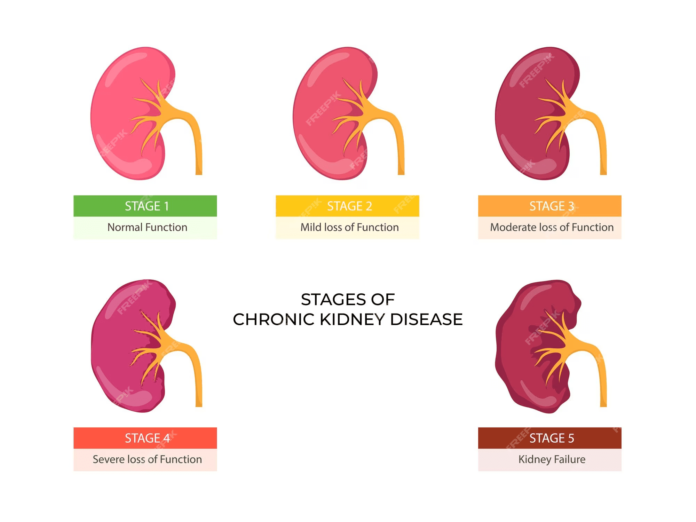
Chronic kidney disease (CKD) is a widespread health issue that affects millions of people worldwide. It is essential for healthcare professionals to have a comprehensive understanding of the pathophysiology of CKD to improve patient management and outcomes. In this article, we delve into the intricate mechanisms that contribute to the progression of CKD and explore potential therapeutic targets for effective management.
Causes and Risk Factors of Chronic Kidney Disease
CKD can arise from various underlying conditions, including high blood pressure, diabetes, and certain genetic disorders. These conditions can lead to kidney damage and impair the organ’s ability to function properly. Additionally, other risk factors, such as smoking, obesity, and a family history of kidney disease, can increase the likelihood of developing CKD.
The pathophysiology of CKD involves a complex interplay of mechanisms that disrupt kidney structure and function. One crucial aspect is the progressive loss of nephrons, the functional units of the kidneys responsible for filtering waste products from the blood. As nephrons are gradually lost, the remaining ones become overburdened, leading to further dysfunction.
Stages of Chronic Kidney Disease
CKD is categorized into five stages, each representing a different level of kidney function. These stages are determined based on the glomerular filtration rate (GFR), which measures how efficiently the kidneys filter waste from the blood. Stage 1 CKD indicates mild kidney damage with normal or high GFR, while stage 5 CKD, also known as end-stage renal disease (ESRD), represents complete kidney failure.
As CKD progresses through the stages, the pathophysiological changes become more pronounced. Inflammation, fibrosis, and oxidative stress play significant roles in the deterioration of kidney function. Additionally, disrupted hormone regulation, electrolyte and fluid imbalances, and impaired acid-base balance further contribute to the intricate pathophysiological processes involved in CKD.
Symptoms and Complications of Chronic Kidney Disease
The symptoms of CKD may vary depending on the stage and underlying cause. In the early stages, patients may be asymptomatic or experience nonspecific symptoms such as fatigue and mild fluid retention. As the disease progresses, symptoms can include persistent high blood pressure, decreased urine output, swelling in the legs and ankles, and anemia.
Left untreated, CKD can lead to severe complications, including cardiovascular disease, bone disorders, and an increased risk of infections. The pathophysiological changes in CKD, such as inflammation and fibrosis, contribute to the development of these complications and can further exacerbate kidney damage.
Diagnosing Chronic Kidney Disease
Early detection and diagnosis of CKD are crucial for initiating prompt treatment and slowing disease progression. Healthcare professionals employ various diagnostic tools and tests to assess kidney function and determine the stage of CKD.
One common diagnostic test is the measurement of creatinine levels in the blood. Creatinine is a waste product that the kidneys eliminate, and elevated levels can indicate kidney dysfunction. Additionally, urine tests, imaging studies, and kidney biopsies may be performed to provide a comprehensive evaluation of kidney health.
Treating Chronic Kidney Disease
The treatment of CKD aims to slow disease progression, manage symptoms, and prevent complications. Healthcare professionals employ a multifaceted approach that may include medication, dietary modifications, and lifestyle changes.
Medications, such as angiotensin-converting enzyme (ACE) inhibitors or angiotensin receptor blockers (ARBs), are commonly prescribed to control blood pressure and reduce proteinuria, a common symptom of CKD. Diuretics may also be used to manage fluid retention, while phosphate binders and vitamin D supplements help maintain mineral balance.
Lifestyle Changes and Self-Care for Chronic Kidney Disease
In addition to medical interventions, lifestyle modifications are essential for managing CKD effectively. These include following a kidney-friendly diet, limiting salt and protein intake, and staying adequately hydrated. Regular exercise, smoking cessation, and weight management are also crucial for overall kidney health.
Self-care plays a significant role in optimizing CKD management. Patients are encouraged to monitor their blood pressure, blood sugar levels (if diabetic), and take medications as prescribed. Additionally, regular follow-up visits with healthcare professionals are essential for monitoring disease progression and adjusting treatment plans as necessary.
Preventing Chronic Kidney Disease
Prevention is key in reducing the global burden of CKD. Adopting a healthy lifestyle, including a balanced diet, regular exercise, and avoiding tobacco and excessive alcohol consumption, can significantly reduce the risk of developing CKD. Additionally, managing underlying conditions such as diabetes and high blood pressure is crucial in preventing kidney damage.
Public health initiatives that raise awareness about CKD risk factors, promote early detection, and encourage preventive measures are essential in reducing the incidence and burden of CKD worldwide.
Conclusion
Understanding the pathophysiology of chronic kidney disease is paramount for healthcare professionals to improve patient management and outcomes. CKD involves intricate mechanisms that disrupt kidney structure and function, leading to the progressive loss of nephrons and impaired renal function. By identifying the underlying causes, diagnosing early, and implementing appropriate treatment plans, healthcare professionals can effectively manage CKD, improving patient quality of life and reducing the risk of complications. With continued research and therapeutic advancements, the future holds promise for better outcomes in the management of chronic kidney disease.




